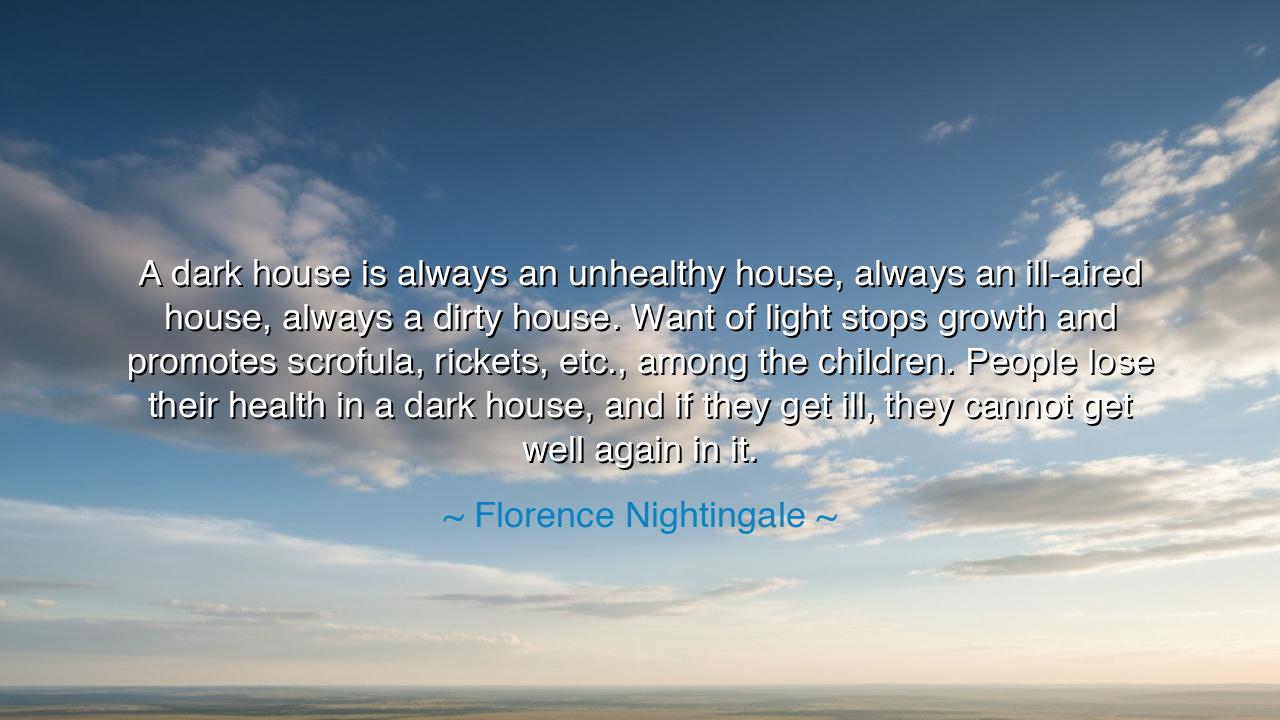
A dark house is always an unhealthy house, always an ill-aired
A dark house is always an unhealthy house, always an ill-aired house, always a dirty house. Want of light stops growth and promotes scrofula, rickets, etc., among the children. People lose their health in a dark house, and if they get ill, they cannot get well again in it.






In the voice of Florence Nightingale, the lady of the lamp and mother of modern nursing, there shines a truth both literal and symbolic: “A dark house is always an unhealthy house, always an ill-aired house, always a dirty house. Want of light stops growth and promotes scrofula, rickets, etc., among the children. People lose their health in a dark house, and if they get ill, they cannot get well again in it.” Though she speaks of architecture and medicine, her words transcend walls and windows—they speak of the human condition itself. For just as the body sickens in the absence of sunlight, so too does the soul decay in the absence of truth, clarity, and hope.
In her time, Nightingale stood against the ignorance of an age that did not yet understand the sacred marriage between light, air, and health. In the hospitals of the 19th century, the wounded were crowded into dark, foul-smelling wards, suffocating under disease and despair. She saw what others did not—that sickness thrives in shadow. Where there is no light, infection festers; where air does not move, death lingers. It was her relentless insistence upon sunlight, fresh air, and cleanliness that transformed not only medicine, but the very way we think of human care. Her crusade for light was a crusade for life itself.
In the Crimean War, when soldiers lay dying not from wounds but from filth and neglect, Nightingale entered their dim barracks, carrying her lamp through the corridors of suffering. She opened windows, cleaned wounds, burned soiled linens, and demanded that light and air be treated as medicines. The mortality rate fell, not through miracle, but through the power of illumination—both of the body and of the mind. Thus her teaching was born: that darkness is not only the absence of light, but the presence of disease, ignorance, and sorrow.
Her words also carry a deeper, timeless metaphor. The dark house is not only a building; it is the human spirit closed off from truth and compassion. Just as a room without sunlight breeds sickness, a life without hope breeds despair. When people shut out joy, curiosity, and love, they too become ill within, unable to recover from their own inward darkness. The lesson of Nightingale’s wisdom is both scientific and spiritual: that light heals—in the ward, in the heart, in the world.
Throughout history, great healers and thinkers have understood this sacred relationship between light and life. In ancient Egypt, the temples of healing were open to the sun; in Greece, Hippocrates taught that air and light were nature’s physicians. Even the builders of cathedrals filled their walls with stained glass so that the sunlight might fall upon the faithful as a symbol of divine grace. Nightingale’s insight, though grounded in medical practice, is the continuation of this ancient reverence: the recognition that illumination—literal and moral—is the foundation of health and holiness alike.
She warns us still, across the centuries, that darkness is the companion of decay. In our homes, we must let in the light; in our hearts, we must do the same. We live in an age where the rooms may be bright with electricity, yet many souls dwell in metaphorical night—choked by stress, neglect, and disconnection from nature. We must remember that health is not only the absence of disease but the presence of harmony—between body, spirit, and environment. The open window, the morning sun, the clean breath of fresh air—these are not luxuries, but the oldest medicines known to humankind.
So let us take the lesson of Florence Nightingale to heart: open your windows, both literal and spiritual. Let light flood your home, and let truth and kindness flood your being. Walk beneath the sun, breathe deeply of the world’s living air, and clear from your life the clutter that blocks illumination. Remember that the sick cannot heal in darkness, and neither can the weary spirit.
And thus her wisdom endures: light is the healer of all living things. To tend the light is to tend life. Keep your house bright, your heart open, and your mind clear, for the light that enters your home is the same light that sustains the universe. As Nightingale taught, health is not found in shadow—it is born where light dwells, and where the human spirit welcomes it with gratitude and care.






AAdministratorAdministrator
Welcome, honored guests. Please leave a comment, we will respond soon